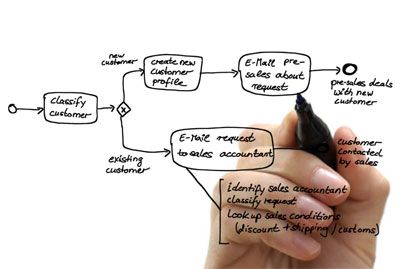
This course introduces concepts of business process modeling using the Business Process Model and Notation (BPMN) industry standard. Participants will learn the elements of process models and their precise meaning. We cover business processes within organizations and also interacting processes involving several organizations, i.e., we investigate process orchestrations and process choreographies. We will also look at techniques to analyze business processes from a formal perspective.
The course centers around concepts and language to describe and analyze business processes. It does not cover methods on how to model, improve, monitor or implement business processes. Still, a deep understanding of business process models is a useful basis for these activities.
Language: English
Advanced, Enterprise Computing, Expert
Course information
Business process models play a central role in describing, analyzing, improving, implementing, and monitoring business processes. They can serve as communication medium for professionals with different background and expertise, ranging from business administration, quality management and organizational development to process improvement, systems architectures and software development. The aim of this course is to provide a common understanding and a common language to improve the communication between these professionals during all phases of business process management projects.
This course introduces concepts of business process modeling using the Business Process Model and Notation (BPMN) industry standard. Participants will learn the elements of process models and their precise meaning. We cover business processes within organizations and also interacting processes involving several organizations, i.e., we investigate process orchestrations and process choreographies. We will also look at techniques to analyze business processes from a formal perspective.
The course centers around concepts and language to describe and analyze business processes. It does not cover methods on how to model, improve, monitor or implement business processes. Still, a deep understanding of business process models is a useful basis for these activities.
You'll find additional video lecturing material on www.tele-task.de.
Attention: This course is currently in self-study mode, in which you do not have access to graded assignments/exams. Therefore, we can only issue you a certificate of participation.
Course contents
Week 1:
Introduction to Business Process ManagementWeek 2:
Basic Business Process ModelingWeek 3:
Week 3Bonus:
BonusWeek 4:
Week 4Week 5:
Week 5Week 6:
Process ChoreographiesExam:
Exam
Enroll me for this course
Learners
Certificate Requirements
- Gain a Record of Achievement by earning at least 50% of the maximum number of points from all graded assignments.
- Gain a Confirmation of Participation by completing at least 50% of the course material.
Find out more in the certificate guidelines.
This course is offered by

Professor Dr. Mathias Weske is chair of the business process technology research group at Hasso Plattner Institute at the Digital Engineering Faculty, University of Potsdam, Germany. The research group aims at addressing real-world problems in business process management with formal approaches and engineering useful prototypes. His research focuses on the engineering of process oriented information systems, process mining, and event processing. The BPT research group has a track record in engineered prototypes with a significant impact on research and practice, including projects like Oryx and jBPT. Dr. Weske is author of the first textbook on business process management and he held the first massive open online course on the topic in 2013. He is on the Editorial Board of Springer’s Computing journal, and he is a founding member of the steering committee of the BPM conference series and, since September 2017, chair of the steering committee.